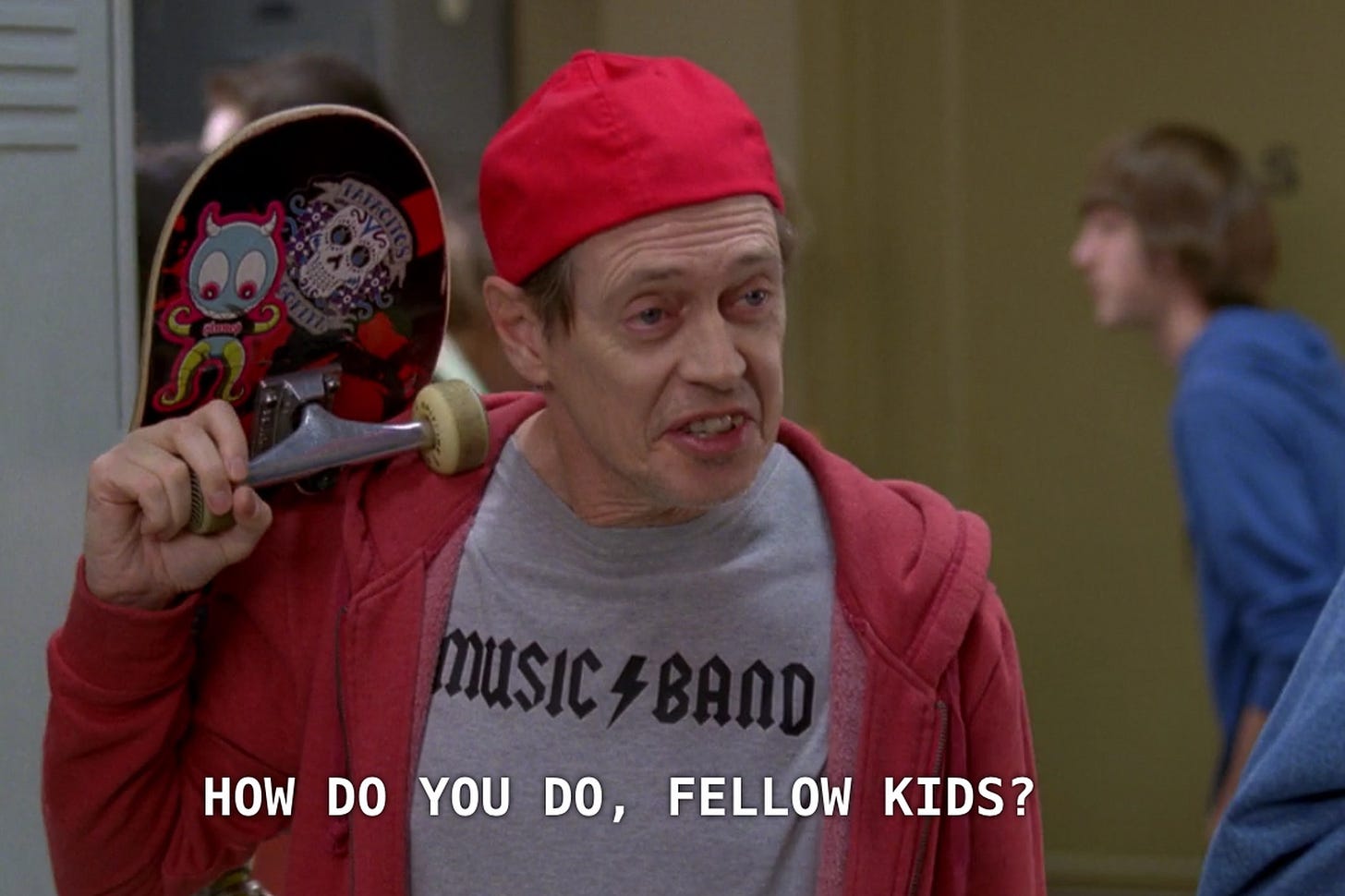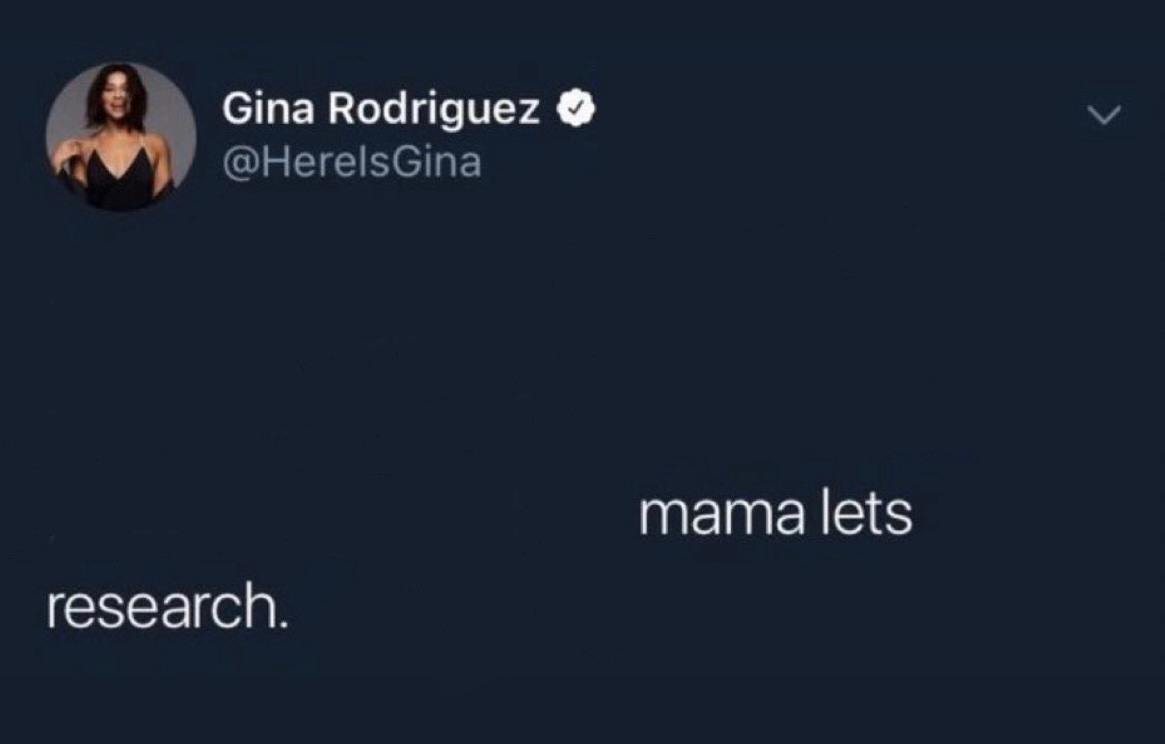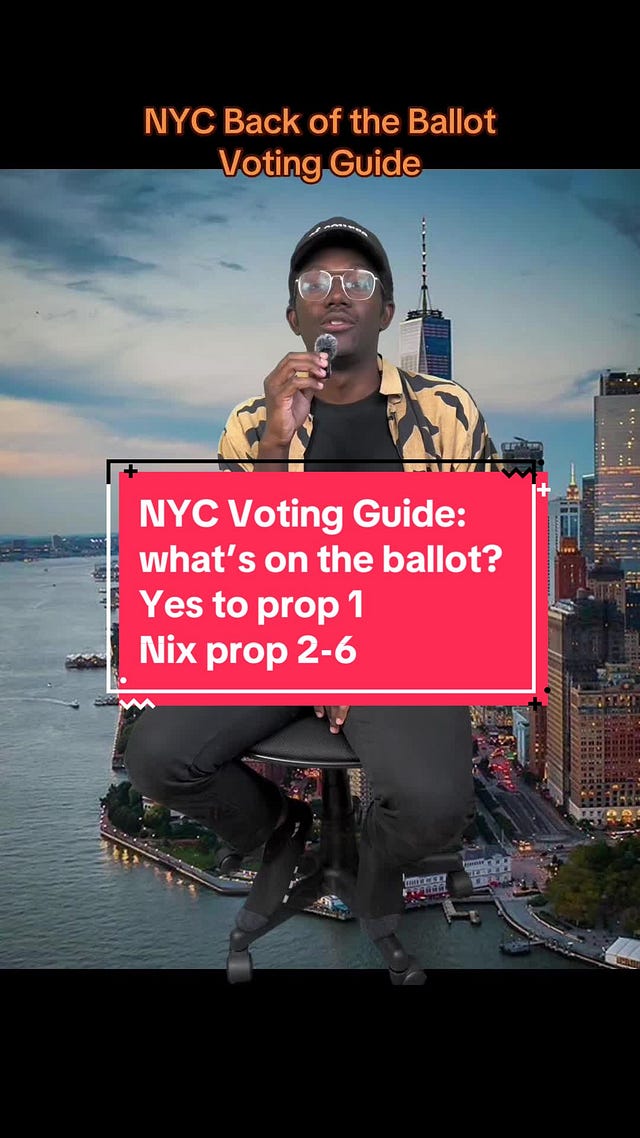Maybe a Sense of Fatalism Regarding the State of American Politics Will Be Our Always
Or, the obstacles Gen Z faces while voting this year
Unfortunately, this post is too long to appear in full in your inbox. I don’t know where it will cut off in the email version, but it will be available online. See you there!!!
As someone who runs a newsletter that pitches itself as “Politics and Pop Culture for the Gen Z Reader,” I have a vested interest in staying in the know about my generation. Granted, I have apparently been actively messing up the years the label “Generation Z” is meant to apply to for reasons still unknown, so you can dock me points on that. But nevertheless, I was born within my beloved Pew Research Center's range of 1997 to 2012 which means I remain a proud member of Gen Z…for now.
Anyway, as of this year, 40.8 million American members of Gen Z are eligible to vote, which is up 8.3 million “newly eligible youth…who will have aged into the electorate since the 2022 midterm election” (X). There is a growing body of discourse taking shape online about Gen Z’s political power and electoral influence: we currently make up 9% of the electorate and, as data from 2020 and 2022 shows, we are displaying higher rates of voter turnout than previous generations did at our age.
And yet, there are still obstacles standing in our way, namely the widening partisan gender gap and the ever-increasing spread of misinformation.
This week, I wanted to talk to someone who is indisputably a member of Gen Z about political identity, media literacy, and why voting is important despite all the memes making it feel silly. Today, I’m joined by my sister Audrey Sharp to talk about all of those things and more!
Hi I’m Audrey, Emily’s younger sister, and I feel like contributing more to this election this year than just my absentee ballot so I decided to talk about political identity and voting!
She Used to Be Socially Liberal But Fiscally Conservative…This is Her Now
When I reflect on how I began to build my political identity, I have to begrudgingly admit that there was a time in my life when I claimed to be socially liberal but fiscally conservative. While typing that phrase out just now made me dry heave, it was the thing to say in high school, and, if you couldn’t tell by everything I’ve ever shared about myself on this newsletter, I was desperate to fit in back then. Forgive your inner teenager, or whatever.
Eventually, I realized what an Ariana Grande on the red carpet PR-trained non-answer of an ideology that was—palatable but nowhere near honest—and the butterfly effect of claiming that sentiment in 2015 has somehow led us here to this very moment. But that’s enough about me (you’re welcome).
Gen Z has a reputation for being politically active primarily on the left of America’s political spectrum, which is often stated in a vaguely pejorative way despite the fact that it makes perfect common sense.1 We have inherited a world marked by seemingly never-ending violence, cynicism being chic, technological advances happening at breakneck speeds, and a 24-hour cycle of really shitty news. Is it any wonder so many of us want to support one another’s human rights, stricter gun laws so we don’t die when we leave the homes we rent, and maybe have a planet where it isn’t 80ºF in late October? Is that too much to ask for?
While I can wax on about research regarding Gen Z and my own personal experience forever, I wanted to bring Audrey into the fold by asking:
Emily: How did you originally develop your political identity?
Audrey: I would say 50% of my political identity developed due to your influence, my dear sister. I was probably the original audience for E4P before it actually existed because you would explain certain events, political figures, and policies to me in a way that my infantile mind could understand.
The other 50% I would attribute to the 2016 Election. I was a sophomore in high school when Trump ran for the first time. I learned quickly that politics were more than what an adult could tell me what to think. It became apparent how much it affected my life, the people around me, and the future of our country.
Emily: What issues are most pressing to you this election, and why?
Audrey: Abortion and gun violence. Also literally maintaining my right to vote hopefully.
I honestly wish I could explain the “why” more, but I shouldn’t even have to. This should be common sense and if I could find a way to make that known to everyone, I would be a politician myself and not work with dogs every day.
Emily: Do you see your views as more right, more left, or generally comparable to your Gen Z peers?
Audrey: Generally comparable, if anything more left. I think socially a lot of Gen Z are geared towards the left, but when it comes to economic and political policies they don’t understand the effect that much.
Some people love to take on what they remember their parents said during the recession or what Trump claims on his social media account and don’t even stop to think about how anything in this country and its economy works. It’s fine if you are economically and politically aware and can support your ideas with evidence, but if your stances are based on what your boyfriend and his friends talk about together while high, then you can’t rightfully stand on anything.
And I don’t know everything either. But I know financial freedom and wealth are not a given for many in this country and I know that I support a government that reaches the average American.
People need to understand that if you’re promoting socially liberal agendas, then you should match your words with your actions and vote for a government that expands social programs to all communities because that influences the political and economic outcome of this country as well.
Of course, I hate being self-referential, but I feel the need here to echo something I said in last week’s piece: no matter what you think of us, Gen Z is not a monolithic group. In fact, Gen Z-aged Americans are
a highly diverse generation whose identities and experiences shape their political attitudes and engagement. About 45% of the 40 million Gen Zs who will be eligible to vote in 2024 are young people of color, including 8.8 million Latinos, 5.7 million Black youth, 1.7 million Asian Americans, and 1.8 million multiracial youth (X).
Among Gen Z voters, it is becoming apparent that the greatest divide is happening along the gender binary. Just yesterday, the New York Times published an Opinion essay from John Della Volpe, the director of polling at the Harvard Kennedy School Institute of Politics, titled “Trump’s Bro Whispering Could Cost Democrats Too Many Young Men.” In it, Della Volpe wrote that
almost exactly equal shares of young men and young women say they will definitely vote in this election or have already done so. But since the spring of 2020, the share of young men identifying as registered Democrats has dropped by seven percentage points, while those identifying as Republicans have increased by seven points — a net shift of 14 points in just four years. Young women, during the same period, shifted two points away from the Republicans.
This reflects reporting from Nate Cohn’s newsletter The Tilt from last Friday which found that
Mr. Trump leads Ms. Harris among young men, 58 percent to 37 percent, across the last three Times/Siena national polls. Ms. Harris holds an even larger lead among young women, 67-28. Surprisingly, Ms. Harris is faring no better than Mr. Biden did among young men in the Times/Siena data, even as she’s made significant gains among young women.
If this enormous gender gap among young voters holds up, it will be one of the most important developments of the election season, one that would at once clarify a surprising trend and perhaps even change how we understand gender and cultural dynamics in America today.
That’s so fun to read!!! Oh gosh, I love statistical evidence to explain why both the male loneliness epidemic and dating culture for heterosexual women are concurrently getting worse!!!
I digress…
The one thing that is marginally more interesting than what is dividing the Gen Z voting bloc right now is actually what is uniting us. According to research conducted by the Berkeley Institute for Young Americans,
many young voters appear to share a belief that fractured, dysfunctional government systems are incapable of addressing critical challenges that fall heavily on their generations. A sense of fatalism extends across the right, center and left…
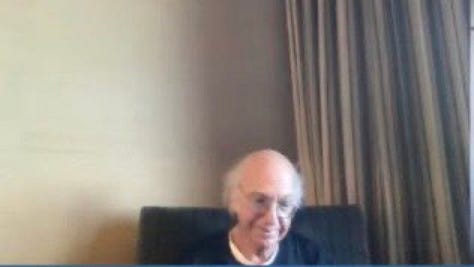

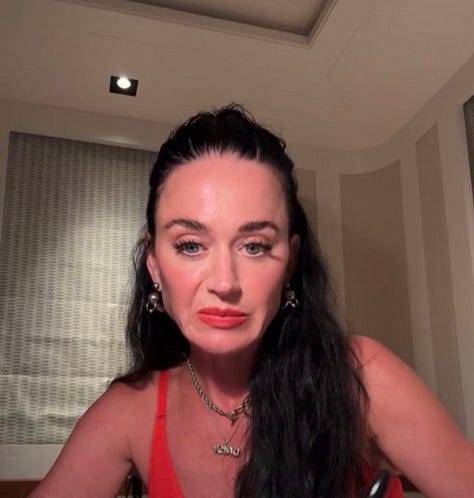
With all of this said, I wanted to know:
Emily: From your perspective, is Gen Z more excited to vote or more demoralized by the state of politics?
Audrey: In 2020, I feel like this generation was more excited. It was the first election I could vote in and I knew so many others felt that same rush and sense of control in our hands that we didn’t in 2016 when we had to watch the world we knew slip out of our fingers.
As we approach this election, I think my generation is more demoralized by the state of politics. How we got here is just truly unreal. I don’t think people understand how much a post-9/11 world has changed society and shaped our generation. I feel like the upheaval of our society and what politics has become has been a slowly moving upward rollercoaster since 9/11 and in 2016, the ride just came down the other side and has been rolling too fast since.
Trump as president, a global pandemic, insurrections, school shootings, a woman of color on the ballot as a presidential candidate—hell, even Biden as president in general—is still not a fathomable reality to me. I remember the second panic attack I ever had was the Sunday night after the Sandy Hook shooting when I sat on the couch in our living room between Mom and Dad screaming and crying, “I don’t want to go to school tomorrow! I don’t want to get shot! I don’t want to die.”
Newsworthy situations happen every minute of every day. But record-breaking snowstorms and summer heat, the Boston Bombing, Sandy Hook, a Northeast sports team winning a championship—these were all such big and out-of-this-world events that stood as their own because of their magnitude.
Now, things that should and would have made stand-alone headlines 10-15 years ago happen on the daily, and no one bats an eye. It’s just another thing. And all of our teams suck as well.2
A part of me wants to get really in the weeds about Gen Z’s political burnout (what caused it, why it persists, how to combat it) but that’s another 6,000 word conversation for another time.
Instead, we’re going to talk about something much lighter: media literacy in the face of rampant online misinformation.
Cite My Sources? How About My Beautiful Mind?
Spend any time on the discourse sides of TikTok or X and you’ll inevitably hear something about how media literacy is dead. This logic often feels like—and often is—a trap, condemning us all to a never-ending cycle of recognizing a problem without enacting a solution.
Before we go further, media literacy is “the ability to critically analyze any story or event presented in the media to determine its accuracy or credibility” (X). Many claim it’s dead for a variety of reasons: people will often read a single source (an article, a Tweet, a TikTok, an installment of their favorite newsletter Emily For President) and accept it as fact at face value; people will only seek out sources (plural) with the same bias that support their existing worldview; or, people will only consume media from a single source, believing it to be superiorly correct option.
Mind you, this section isn’t a dig at the Fox News crowd or, in fact, any subgroup in particular—in a YR Media article on this exact conversation, Knives Nguyen explains why improving media literacy is an “all of us” issue:
Without a doubt, a society that refuses to engage in critical thinking and takes the information it sees and hears for face value cannot defend itself from disinformation. A faulty news article can spread like wildfire out of fear. A reactionary video can be seen as real when its only goal is to gain likes and views.
Inevitably, although Gen Z was not the first to encounter this issue, Gen Z can fight for the right to education and a more intellectual future. Becoming a better and more critical consumer will be a tremendously useful skill as the internet and social media become more and more complex for generations to come.
Curious to know if my sister was a critical consumer or not, I asked:
Emily: Which sources do you turn to most for political news? Does what you consume influence what you believe or vice versa?
Audrey: Consciously I read the most articles from the Washington Post probably, watch CNN, and grab my quick tidbits from Apple News.
Unconsciously, I receive a lot of information from TikTok and X. I am regularly on those apps as I use them for absentminded social media scrolling, and I’ll see a lot of news come through. But I then read up more on credible articles or news sources.
I credit my international relations course during my senior year of high school for teaching me about biased versus unbiased news sources. That has influenced me to this day to not just believe what I read but take in the facts and form my own educated opinion about what I consume.
Like Audrey, the rest of Gen Z is increasingly getting their news from social media, with 32% of 18-29-year-olds who responded to a 2023 Pew Research Center survey claiming they regularly get news from TikTok:

More to it, Her Campus’s GenZology data collection team found that of those they polled, “over half of Gen Z chooses TikTok over Google as their #1 search engine” (X).3 These stats are not all bad—many legacy media publications have recognized this and are finding ways to re-shape their content for social consumption, so that “getting your news from TikTok” may mean you’re still getting your news from MSNBC or the New York Times. It also allows space for independent journalists and experts like Jessica Valenti and Taylor Lorenz to meet their target audiences where they already are.
I wanted to keep any biases that social media was a scourge to critical thinking, so I open-endedly asked Audrey:
Emily: How has the internet and social media influenced your politics, if at all?
Audrey: I mean obviously it has had to, but I didn’t learn my views and values from a TikTok or Instagram infographic if meaning in that sense…Actually, that’s such a lie and I’m thinking too “present day.” No doubt 2015 Twitter literally shaped my views and the rest of my personality.
I have always felt like justice has been a value I’ve upheld deeply in my personal life and it was always a no-brainer for me to want equality for everyone. I lived and still live by the golden rule. Also because (surprise, surprise) what you teach and show kids actually influences them, I am lucky to have had parents who emphasized the importance of kindness, not judging others, and being open-minded.
But then also my silly little mind went on throughout school thinking racism ended with slavery until then one day in 8th Grade my privileged self made the smart choice to open Twitter and I quickly realized liberty and justice are just a façade in this country.
Emily: Follow up: have you noticed its influence on the rest of your generation? If so, in what ways?
Audrey: Durrrr, because people love to latch onto something outrageously specific, like “Kamala has a Glock,” and run with it. People get so hung up on a single word, phrase, or headline, and weaponize that language into something they can use against others.
Instead of thinking for themselves, they’ll use what they can scavenge on the internet or what comes up on their feed to wholly create their points, not even to back up original ideas.
Okay so…some issues with that! While I’m not defending people who do not know how to think for themselves, I will say that our current media and social media landscapes are not doing us many favors.
As I was conducting research for this piece, I came across an article published by Yes! Media that claimed Gen Z was “politically engaged but electorally absent,” a sentiment that felt very antithetical to the majority of polling and reporting we have seen over the past four years. The piece argued that “almost 75% of [Gen Z] believe that being ‘politically engaged is important to [their] identity’” but that “if voting is considered to be a baseline criteria for being ‘politically engaged,”’ the percentage of Zoomers that fit the bill would drop from 75% to 28.4%, which is the percentage of voters aged 18 to 24 that voted in the 2022 midterms.”
That last sentence linked to a source I was already using for this piece, which is a report from Tufts University’s Center for Information and Research on Civic Learning and Engagement (CIRCLE), titled “The Youth Vote in 2022.” The serendipity of this situation offers us the perfect test case for the importance of being actively media literate. Viewers at home: please follow along as I deconstruct bias and misinformation in real-time.
Right off the bat, the Yes! article mixed up the exact percentage of Gen Z voters: the statistic they referenced—that 28.4% of 18-24-year-old voters voted in the 2022 midterms—actually came from a different CIRCLE report than the one that was linked in the Yes! piece. Ironically, that report’s headline is, I shit you not, “Gen Z Voted at a Higher Rate in 2022 than Previous Generations in their First Midterm Election.”
The CIRCLE report that was linked in the article analyzed a larger data set of voters (aged 18-29) and found that amongst that age range, the percentage of eligible voters who cast a ballot in the 2022 midterms was 27%. And, yes, while both 27% and 28.4% seem like small numbers, the linked report stated the following verbatim:
Based on exit poll data immediately available following the 2022 midterm elections, we estimate that 27% of youth (ages 18-29) cast a ballot in 2022, making this the midterm election with the second-highest youth voter turnout in almost three decades. We also estimate that youth turnout was even higher in some battleground states.
After hovering around 20% turnout in midterm elections since the 1990s, young people shifted that trend in 2018 and largely maintained that trend in 2022, with more than a quarter of young people casting a ballot. Youth are increasing their electoral participation, leading movements, and making their voices heard on key issues that affect their communities (X).
Mind you, the article never proves that Gen Z isn’t voting so much as they are growing increasingly dissatisfied with the two-party system and elected officials who do not represent their interests, which is like…no shit. Aren’t we all?
Now, there are a few things that are incredibly infuriating to me about this situation: the first is that the piece maintains an overall pessimistic tone even when making an argument for improving education around voting and voter registration. The second is that it repeatedly misrepresents information to support that pessimism and, by the end, begins to feel a little predatory in the way it discusses Gen Z’s very real concerns about American politics at home and abroad.
The third and probably most infuriating thing is that the author implies that Gen Z voters will not fact-check sources when they get their political information from the internet, claiming that
Zoomers’ connection with political issues and disconnection with voting might also have to do with the fact that they get most of their political information from the internet, particularly social media…The problem is that social media is not as good at disseminating logistical information about how to vote in one’s county as it is at increasing political polarization and playing on people’s emotions—by algorithmic design. The result: Gen Z is well informed about social and political issues but is lost on the basics of voting (X).
First and foremost, can we all agree Zoomer is a lazy nickname? Where did the creativity that invented Millennials come from, and where has it gone?
Second and second most, you should not be allowed to complain about a problem as you are actively making that problem worse. At a time when 73% of Americans “say they have seen inaccurate news coverage about the election at least somewhat often” and “about half of Americans (52%) say they generally find it difficult to determine what is true and what is not when getting news about the election,” it is incredibly reckless to be misrepresenting information—especially positive information.

Look—it did not take me very long to double check that no, I was not going crazy, and that yes, Gen Z voter turnout is admirably high and should be celebrated.4 But this is an innocuous-seeming article about voting from an innocous-seeming site that doesn’t even come up that early in search results for Gen Z and voting. If there is misinformation on this small of a scale happening in this inconsequential of a corner of the internet, you can imagine what is happening when stories get over-amplified, blown out of proportion, or misrepresented on social media or via other sources.
Tired of hearing myself yap, I wanted to ask Audrey:
Emily: How regularly would you say you encounter political misinformation online and how do you process or respond to it?
Audrey: Referring back to my high school international relations course. If there is anything I took away from the class is that it is unbelievably hard to find unbiased news in the media and other forms of journalism.
So I would say daily.
I think taking the extra time to research what an article is about and if it has to do with certain bills being passed or an event happening, I would familiarize myself with what the situation was and form my own educated opinion about how I feel about it once I have the whole story.
Obviously, people have jobs and want mindless scrolling on social media so it’s easier said than done, but I think that’s the most important thing and is worth the time if they really want to talk and act like they have an opinion about our country.
In terms of how I respond to it when I see a shocking headline or someone tells me about something they saw, I don’t respond with emotion about it. It happened, thanks for telling me, but if I’m going to speak on it in a conversation or post on my Instagram, you bet I will be finding out more information about it and will actually highlight certain important aspects where you can see how it’s effective.5
As we’re getting down to the wire on this election, it will become ever-more important to double-check information across multiple sources just as Audrey does. This is especially key if something you read, see, or hear sounds counter to the majority of sources you’re encountering—like I clocked with the piece from Yes!—or if it elicits an emotional response, as Audrey explained.
Media literacy is not this big, insurmountable obstacle we have to rigorously study and uphold and fear—it is a practice that can be summed up with the last line of this Tweet from Gina Rodriguez:
Vote Save Emily For President
In 2020, some people got really into sourdough while others became determined to watch everything Netflix had to offer. Me? I drank so much that I probably took 10 years off my life and I became obsessed with learning about voting rights around the country.
That shouldn’t come as a surprise given everything going on here, but wanted to just get that on the record to be safe.
It should go without saying that I’m not the only one voting is important to. I mean, Stacey Abrams comes to mind first—I know it’s important to her. Voting is definitely important to E4P superstar Alexis Greenblatt, we know that. Maybe…it’s important to the election officials in Maricopa County, Arizona who have to conduct their jobs
behind new fencing and concrete barriers, drones will patrol the skies overhead, police snipers will perch on rooftops and mounted patrols will stand ready. Across the state, election workers have gone through active-shooter drills and learned to barricade themselves or wield fire hoses to repel armed mobs. At the ready are trauma kits containing tourniquets and bandages designed to pack chest wounds and stanch serious bleeding (X).
What do we think? Important to them? Do we think it’s also important to the people who have made filling in bubbles on a sheet of paper a life-or-death situation?
I think all of the memes and jokes and hysterical laughing to keep from crying over the past eight years has made voting a bit. Is there a problem in your daily life? STAY IN LINE!!!! Pokémon go to the polls!!!! January 6th was a day of love!!! And yet, as I literally just said in the paragraph not four sentences ago, people have and may very well continue to die for voting rights. It really is that serious.
And look: I am not saying and will never say voting is the be all end all—it is always just the first step toward progress. But the least I can do is continue to emphasize the significance of voting in every race and regarding every proposition down your ballot. Even states like New York, often thought to be solidly blue, have important races for control over the state’s House of Representatives and propositions that could give Turkish Airlines Frequent Flyer Eric Adams incredible power despite his indictment.
 Tiktok failed to load.
Tiktok failed to load.Enable 3rd party cookies or use another browser
(By the way: I say all of this as someone who is officially a New York resident and voter…miracles happen once in a while when you believe.)
Much in the way I used to force under the threat of violence kindly ask my baby sister to encourage my storylines when we would play make believe in our basement, I wanted her to really hammer home some of these points:
Emily: Why is voting important to you?
Audrey: Voting is important to me because we can actively decide the change we want to see. As cliché as it sounds, there are many places in the world that do not have this privilege. As a woman as well, I would feel inherently guilty if I didn’t vote and that I would be betraying so many before this time who fought to have this right.
This country was supposed to be based on the ideals of a “democracy” that we could all live “free.” That has never been the standard of foundation and it feels like it never will be. We live in a patriarchy and a society built on white supremacist ideology. It’s so disheartening, frustrating, and soul-breaking that every day I know I am not seen as an equal in merely just the makeup of our society, our language, our media portrayal, everything.
If there is one thing I have control over, it’s that I still can vote. On the ballot, I am seen the same as every other person next to me. I sure as hell am going to not take that for granted and go out and vote for every inch that gets closer to an equitable society.
We know from a recent MIT model that trying to debunk election misinformation doesn’t appear to have any effect if the person you are talking to believes the inaccuracies to be proven fact. But talking to people who might agree with you on facts while differing on casting a ballot can be a different story.
I wanted to get Audrey’s opinion on this, so I asked:
Emily: What would you say to someone who agrees with you on some or most issues but is still on the fence about voting?
Audrey: Well, my therapist has been helping me work on boundaries with people in terms of fixing their problems for them, so I don’t think she would condone the kicking and screaming I want to do when someone tells me they’re not going to vote.
But I try so hard to emphasize the importance of voting, and educating yourself on what is happening in local and state governments.6
Emily: I'm curious if you'd be comfortable sharing who you're voting for in two weeks and why.
Audrey: Harris and Walz bitccchhh. Next question.
Alright! Final question coming right up then:
Emily: Is it hard being this brilliant?
Audrey: I yearn to be blissfully ignorant and highly unaware of literally everything in life.
Unfortunately, being politically active is a knife.
So many thank you’s to Audrey for being engaged and smart and funny!!! Existing in this world and our current political climate can get heavy and hard and weird and I’m so fortunate that I have Audi not only to turn to when I want to talk through things that are unfolding, but that she’s an active voice in my generation. Look at that—an E4P piece ending on a hopeful note!!
Make sure you’re registered to vote at Vote.org and make a plan to vote today!!!
It’s taking everything in me not to make a series of woke jokes here because, again, I’m trying to assure everyone I really am a member of Gen Z and nothing screams cheugy like calling Gen Z woke.
When I asked Audrey to explain this one, she simply replied: “The Patriots, Bruins, and Red Sox all suck now…the Bruins are not bad but they always fumble the playoffs.” Guess it’s the season of the sticks…
Ironically, the way that I found this data was via another Axios piece which claimed that “Multiple polls have found TikTok to be the top source of news for Gen Z, and an increasingly popular source for Americans overall.” However, when you click on the hyperlink for multiple and the one for polls, they both bring you to a different page on GenZology’s website, neither of which shows any data regarding Gen Z’s news consumption.
There are media literacy lessons everywhere for those nosy enough to find them.
50% of eligible voters aged 18-29 voted in the 2020 election (up 11% from 2016) with many predicting an even higher turnout this year. Let’s celebrate that!!!!
I posted an Instagram story asking people how often they encounter misinformation online. As of 8:30 pm (the story was posted at 1:05 pm), 29 people have answered and the average response is halfway between “On and off / Occasionally” and “Regularly / Often.”
Did I do a good job raising her or what? (Sorry, Danielle <3 )



